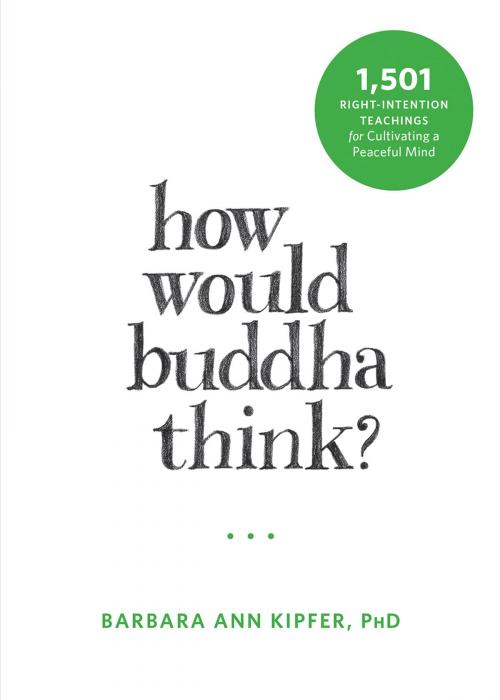How Would Buddha Think?
1,501 Right-Intention Teachings for Cultivating a Peaceful Mind
Nonfiction, Health & Well Being, Psychology, Cognitive Psychology, Religion & Spirituality, Eastern Religions, Buddhism, Self Help, Self Improvement| Author: | Barbara Ann Kipfer, PhD | ISBN: | 9781626253179 |
| Publisher: | New Harbinger Publications | Publication: | July 1, 2016 |
| Imprint: | New Harbinger Publications | Language: | English |
| Author: | Barbara Ann Kipfer, PhD |
| ISBN: | 9781626253179 |
| Publisher: | New Harbinger Publications |
| Publication: | July 1, 2016 |
| Imprint: | New Harbinger Publications |
| Language: | English |
“All that we are is the result of what we have thought.”
—The Buddha
Every word and every action begins with a thought. Negative thoughts based in jealousy, greed, or hatred may seem harmless on the surface. After all, they’re only thoughts, right? But while thoughts are only in our head, they often betray our intentions, and can directly shape our actions. So, how can you overcome internal negativity and live more consciously?
In How Would Buddha Think?, best-selling author of 14,000 Things to Be Happy About, Barbara Ann Kipfer offers an insightful, modern take on the ancient teaching of Right Intention—an important tenet of the Buddhist Eightfold Path focused on the belief that our intentions drive our actions.
With this book as your guide, you’ll learn how to move past negative thoughts or ill will toward others and instead focus on altruism, purpose, and self-actualization—qualities needed to help you live a truly happy life.
“All that we are is the result of what we have thought.”
—The Buddha
Every word and every action begins with a thought. Negative thoughts based in jealousy, greed, or hatred may seem harmless on the surface. After all, they’re only thoughts, right? But while thoughts are only in our head, they often betray our intentions, and can directly shape our actions. So, how can you overcome internal negativity and live more consciously?
In How Would Buddha Think?, best-selling author of 14,000 Things to Be Happy About, Barbara Ann Kipfer offers an insightful, modern take on the ancient teaching of Right Intention—an important tenet of the Buddhist Eightfold Path focused on the belief that our intentions drive our actions.
With this book as your guide, you’ll learn how to move past negative thoughts or ill will toward others and instead focus on altruism, purpose, and self-actualization—qualities needed to help you live a truly happy life.















